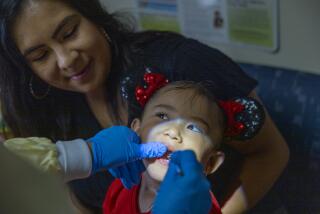‘Dental Fears’ Clinic Intends to Still Chattering Teeth
- Share via
KANSAS CITY, Mo. — In the movie “Marathon Man,” actor Dustin Hoffman is tortured with a dentist’s drill. Millions of Americans can relate to his terror.
But dentists say there’s no need to be so fearful.
The Dental Fears clinic at the University of Missouri-Kansas City dental school is one of many schools and clinics that have programs to help people conquer their fears.
“Our goal is to make patients comfortable enough to return for treatment on a regular basis,” said Dr. Alan Glaros, who started the Missouri clinic this year.
Some patients learn fear from friends or family. Others have had a bad experience, while some have many phobias, dentistry included.
The American Dental Assn. takes no official position on programs to help phobic patients, but “anything that helps people get needed dental care is welcome,” said Susan Shaffer, a spokeswoman for the Chicago-based group.
Nationwide, some 35 million adults experience dental anxiety, Shaffer said.
The first step to overcoming it is a conversation.
“The first visit they come and talk with me in an area where there is no dental equipment whatsoever around. We just sit and chat,” Glaros said. “Then they have a brief visit with our faculty dentist, Tom Vopat, and we decide where to go from there.”
Some patients may need several visits before any dental work can be done.
“For the people who are very afraid of drills or very afraid of injections, it usually takes them a number of sessions to get to where they are comfortable,” Glaros said.
Patients are told as much or as little as they want to know about what will be done. Patients also are taught relaxation techniques and imagery to help them focus on something other than the dental procedure.
“If we’re doing some drilling and the patient wants him to stop, we work out a signal where we will stop immediately,” Glaros said.
The clinic staff will use nitrous oxide, also called laughing gas, if a patient requests it, along with medications such as Novocain.
Debbie Henry travels 70 miles from her home in the south-central Missouri town of Calhoun to the clinic. Henry, who suffers from jaw joint problems, said she has feared the dentist since she had a bad experience as a child.
“I started getting upset and crying, and he said, ‘If you don’t shut up, I’m going to slap you.’ Then he slapped his hands over my eyes so I couldn’t see what he was going to do,” she said.
The clinic has helped, she said, but she still prefers not to be told details of what the dentist is doing.
“I don’t want to hear every little detail about drilling or scraping. Anything major, fine, but that’s it,” she said.
Joyce Rizzardi also drives a long distance, 80 miles from Westphalia, Kan., to the clinic.
“I was probably one of the worst cases in Kansas and Missouri they have ever seen. I was extremely terrified. I had to have nitrous oxide even to have my teeth cleaned,” she said. “I would have embarrassing crying spells. Without this clinic, I don’t know where I would have gone for dental care.”
More to Read
Sign up for Essential California
The most important California stories and recommendations in your inbox every morning.
You may occasionally receive promotional content from the Los Angeles Times.










